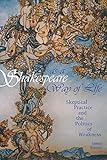Shakespeare as a Way of Life : Skeptical Practice and the Politics of Weakness / James Kuzner.
Material type: TextPublisher: New York, NY : Fordham University Press, [2016]Copyright date: ©2016Description: 1 online resource (232 p.)Content type:
TextPublisher: New York, NY : Fordham University Press, [2016]Copyright date: ©2016Description: 1 online resource (232 p.)Content type: - 9780823269945
- 9780823269969
- 822.33 23
- online - DeGruyter
- Issued also in print.
| Item type | Current library | Call number | URL | Status | Notes | Barcode | |
|---|---|---|---|---|---|---|---|
 eBook
eBook
|
Biblioteca "Angelicum" Pont. Univ. S.Tommaso d'Aquino Nuvola online | online - DeGruyter (Browse shelf(Opens below)) | Online access | Not for loan (Accesso limitato) | Accesso per gli utenti autorizzati / Access for authorized users | (dgr)9780823269969 |
Frontmatter -- Contents -- Introduction: Shakespeare's Skeptical Practice and the Politics of Weakness -- Chapter 1. Ciceronian Skepticism and the Mind- Body Problem in Lucrece -- Chapter 2. "It stops me here": Love and Self- Control in Othello -- Chapter 3. The Winter's Tale: Faith in Law and the Law of Faith -- Chapter 4. Doubtful Freedom in Th e Tempest -- Chapter 5. Looking Two Ways at Once in Timon of Athens -- Epilogue: Shakespeare as a Way of Life -- Acknowledgments -- Notes -- Index
restricted access online access with authorization star
http://purl.org/coar/access_right/c_16ec
Shakespeare as a Way of Life shows how reading Shakespeare helps us to live with epistemological weakness and even to practice this weakness, to make it a way of life. In a series of close readings, Kuzner shows how Hamlet, Lucrece, Othello, The Winter's Tale, The Tempest, and Timon of Athens, impel us to grapple with basic uncertainties: how we can be free, whether the world is abundant, whether we have met the demands of love and social life.To Kuzner, Shakespeare's skepticism doesn't have the enabling potential of Keats's heroic "negativity capability," but neither is that skepticism the corrosive disease that necessarily issues in tragedy. While sensitive to both possibilities, Kuzner offers a way to keep negative capability negative while making skepticism livable. Rather than light the way to empowered, liberal subjectivity, Shakespeare's works demand lasting disorientation, demand that we practice the impractical so as to reshape the frames by which we view and negotiate the world.The act of reading Shakespeare cannot yield the practical value that cognitive scientists and literary critics attribute to it. His work neither clarifies our sense of ourselves, of others, or of the world; nor heartens us about the human capacity for insight and invention; nor sharpens our ability to appreciate and adjudicate complex problems of ethics and politics. Shakespeare's plays, rather, yield cognitive discomforts, and it is just these discomforts that make them worthwhile.
Issued also in print.
Mode of access: Internet via World Wide Web.
In English.
Description based on online resource; title from PDF title page (publisher's Web site, viewed 02. Mrz 2022)


